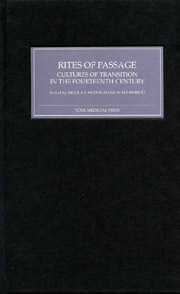Book contents
- Frontmatter
- Contents
- List of Contributors
- Preface
- Introduction: Rites of Passage
- Re-writing a Rite of Passage: The Peculiar Funeral of Edward II
- Coming to Kingship: Boy Kings and the Passage to Power in Fourteenth-Century England
- Boy/Man into Clerk/Priest: The Making of the Late Medieval Clergy
- Manners Maketh Man: Living, Dining and Becoming a Man in the Later Middle Ages
- Rites of Passage in French and English Romances
- Becoming Woman in Chaucer: ‘On ne naît pas femme, on le meurt’
- John Gower's Fear of Flying: Transitional Masculinities in the Confessio Amantis
- ‘Le moment de conclure’: Initiation as Retrospection in Froissart's Dits amoureux
- Index
- YORK MEDIEVAL PRESS: PUBLICATIONS
John Gower's Fear of Flying: Transitional Masculinities in the Confessio Amantis
Published online by Cambridge University Press: 12 September 2012
- Frontmatter
- Contents
- List of Contributors
- Preface
- Introduction: Rites of Passage
- Re-writing a Rite of Passage: The Peculiar Funeral of Edward II
- Coming to Kingship: Boy Kings and the Passage to Power in Fourteenth-Century England
- Boy/Man into Clerk/Priest: The Making of the Late Medieval Clergy
- Manners Maketh Man: Living, Dining and Becoming a Man in the Later Middle Ages
- Rites of Passage in French and English Romances
- Becoming Woman in Chaucer: ‘On ne naît pas femme, on le meurt’
- John Gower's Fear of Flying: Transitional Masculinities in the Confessio Amantis
- ‘Le moment de conclure’: Initiation as Retrospection in Froissart's Dits amoureux
- Index
- YORK MEDIEVAL PRESS: PUBLICATIONS
Summary
Aviation and social challenge
Icarus, in the classical fable and Book IV of John Gower's Confessio Amantis, flies too high on artificial wings, against the advice of his father Daedalus. As the wax holding his flying machine together melts in the heat of the sun, Icarus goes into tailspin, plunges into the sea and drowns. Phaeton, on the other hand, again in contravention of paternal wisdom, pilots a flying chariot too low; he also submits to a watery death. The tales of these early aviators were regularly told together in the Middle Ages and operated as a double warning against the dangers of contravening the laws of nature and patriarchal authority. In a discussion of altitude these stories configure natural law on a vertical axis; the warning is specifically about violating the hierarchical structures of social condition. Gower's poem does not deviate from this medieval tradition as shown in the link between the tales of the two mythological airmen:
In hih astat it is a vice
To go to lowe, and in service
It grieveth forto go to hye. (IV, ll. 1035–7)
Icarus and Phaeton warn those who would abandon the fixity of social categories that alternatives can be insubstantial and mutable zones of risk.
My title, of course, refers to Erica Jong's 1974 novel Fear of Flying. Written at the height of the second wave feminist movement, Jong's novel tells the story of Isadora Wing, a young Jewish woman trying to find her feet, or rather wings, amongst the contradictory and changing models of feminine behaviour at that time.
- Type
- Chapter
- Information
- Rites of PassageCultures of Transition in the Fourteenth Century, pp. 131 - 152Publisher: Boydell & BrewerPrint publication year: 2004



